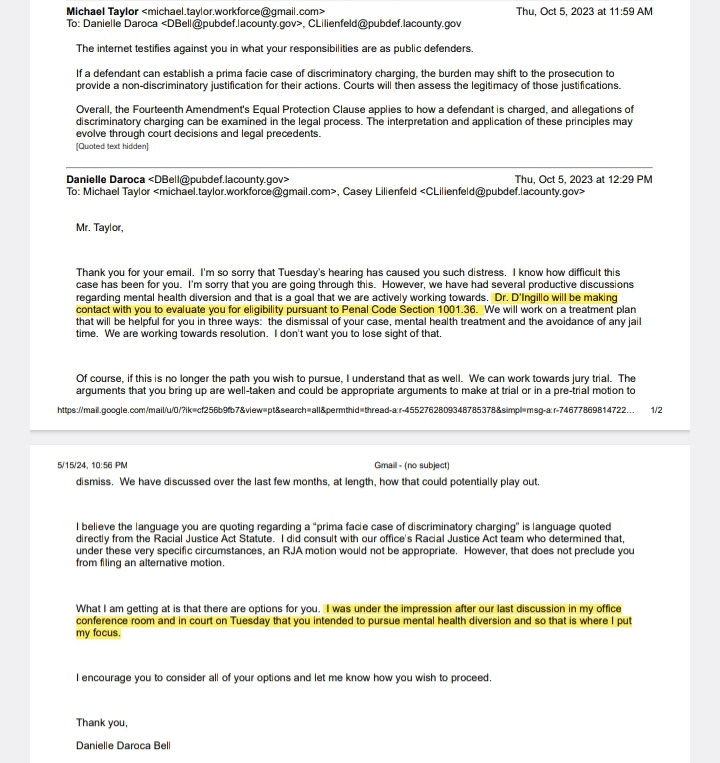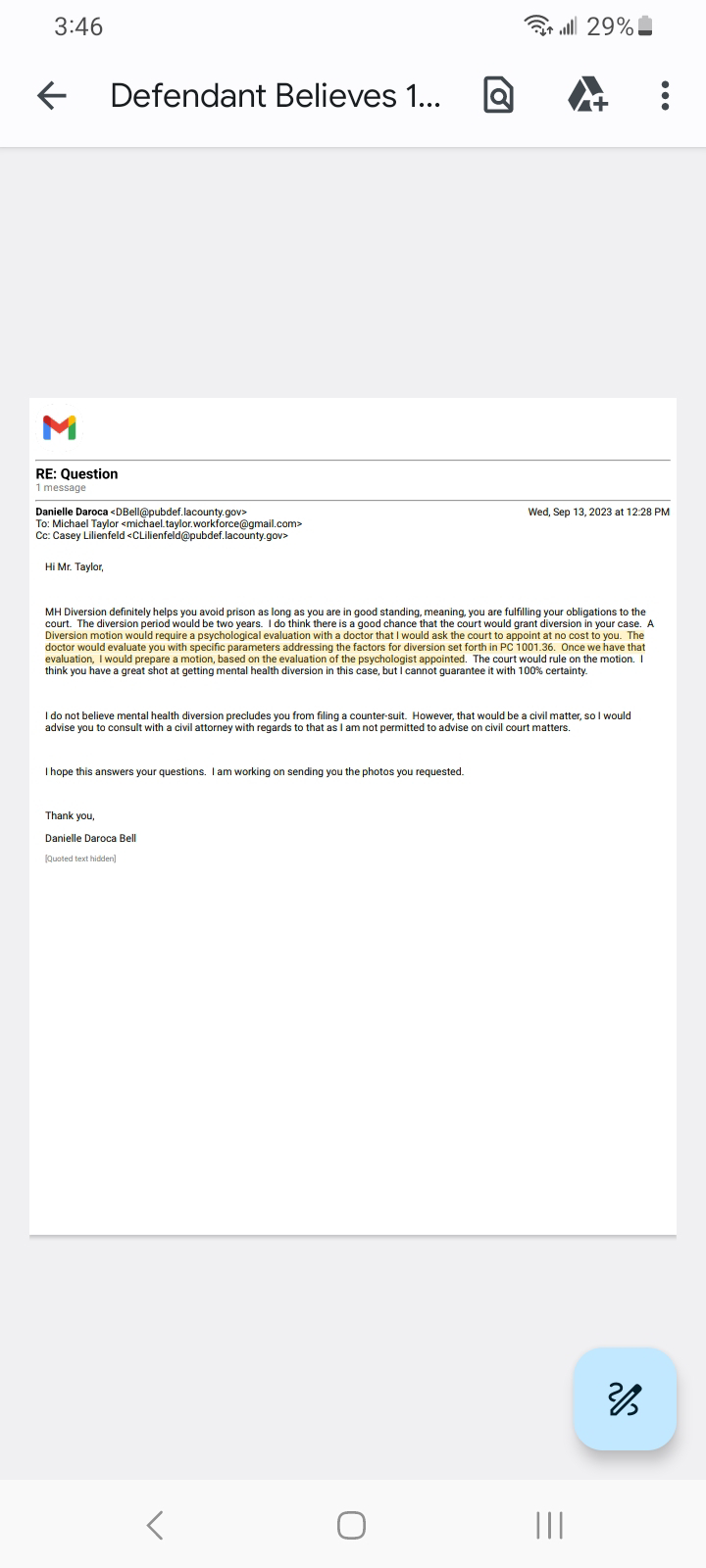Proof Ms. Danielle Marie Daroca-Bell Deceived Michael Taylor Into PC 730 Competency Assessment | Due Process Violations
Below is proof that defendant Michael Taylor was not informed by Deputy public defender Ms. Danielle Marie Daroca-Bell that the psych evaluation for mental health diversion would instead be pursuant to a competency assessment. With obvious misdated clerical errors in the assessment itself, the assessment being permissibly suppressed from the defendant at the discretion of Judge Ronald Owen Kaye, and the willful failure of the court to address these errors before subjecting the defendant to PC 1368 proceedings amounts to judicial misconduct.
These documents serve as evidence that defendant Michael Taylor was not properly informed by his Deputy Public Defender, Ms. Danielle Marie Daroca-Bell, about the nature of his psychological evaluation. Initially intended for mental health diversion pursuant to PC 1001.36, the evaluation was conducted pursuant to a PC 730 competency assessment without his knowledge. Furthermore, the assessment contains misdated clerical errors, was withheld from the defendant at the discretion of Judge Ronald Owen Kaye, and these errors were not addressed before initiating Penal Code (PC) 1368 proceedings. These actions collectively amount to judicial misconduct.
1. Lack of Proper Notification
Defendant Michael Taylor was under the impression that the psychological evaluation was for the purpose of mental health diversion, not a competency assessment. This misunderstanding was due to the failure of Ms. Danielle Marie Daroca-Bell, the Deputy Public Defender, to inform him of the true nature of the evaluation. This omission deprived the defendant of the opportunity to adequately prepare for and understand the implications of the assessment.
2. Misdated Clerical Errors
The competency assessment in question contained obvious misdated clerical errors. Accurate dates are crucial in legal documents to maintain the integrity and sequence of the proceedings. These errors could potentially impact the validity and reliability of the assessment's findings, further undermining the defendant's rights.
3. Suppression of the Assessment
Judge Ronald Owen Kaye allowed the assessment to be withheld from Michael Taylor. The defendant was not given access to this critical document, hindering his ability to make informed decisions about his defense and undermining his right to a fair process.
4. Judicial Misconduct
The court's failure to address the clerical errors in the competency assessment before subjecting Michael Taylor to PC 1368 proceedings constitutes judicial misconduct. This misconduct is characterized by:
- Violation of Due Process The defendant's right to due process was violated by not being properly informed about the nature of the evaluation, not having access to the assessment, and the court's disregard for the clerical errors.
- Infringement of Fair Trial Rights The suppression of the assessment and the proceeding with PC 1368 proceedings without addressing the errors compromised the fairness of the trial process.
- Failure to Correct Errors The court's inaction regarding the clerical errors in the assessment further exacerbates the misconduct, as these errors directly impact the legitimacy of the competency proceedings.
Conclusion
The combination of these factors—lack of proper notification about the evaluation's purpose, misdated clerical errors in the assessment, suppression of the document from the defendant, and the court's failure to rectify these issues before moving forward with competency proceedings—amounts to a significant violation of Michael Taylor's constitutional rights. These actions collectively demonstrate judicial misconduct and underscore the need for immediate remedial actions to uphold the integrity of the legal process and ensure the defendant's rights are protected.
---
Recommendations for Remedial Actions
1. Review and Correct Clerical Errors The misdated clerical errors in the competency assessment must be formally reviewed and corrected on the record to maintain transparency and accuracy.
2. Provide Full Disclosure to Defendant Michael Taylor should be granted immediate access to the corrected competency assessment and any other pertinent documents to ensure he can make informed decisions regarding his defense.
3. Reevaluate Competency Proceedings Given the due process violations, a reevaluation of the competency proceedings should be conducted to ensure fairness and adherence to legal standards.
4. Investigation of Judicial Misconduct An independent investigation into the actions of Judge Ronald Owen Kaye and Deputy Public Defender Ms. Danielle Marie Daroca-Bell should be initiated to address the potential judicial and professional misconduct in this case.
By addressing these issues, the court can work towards restoring the defendant's constitutional rights and ensuring the integrity of the judicial process.
Implications of Defendant Michael Taylor Being Committed Under These Circumstances
1. Violation of Due Process Rights
- Lack of Informed Consent The defendant was not informed that the psychological evaluation would be for competency assessment rather than for mental health diversion. This omission by the Deputy Public Defender impinges on Michael Taylor’s right to be informed of significant legal proceedings affecting him.
- Suppressed Information Withholding the assessment from Michael Taylor deprived him of the opportunity to understand the charges and evidence against him, thereby violating his right to participate fully in his defense.
2. Impact of Clerical Errors
- Questionable Validity of Assessment Misdated clerical errors undermine the reliability and validity of the competency assessment. These errors could potentially alter the outcome of the evaluation, leading to an incorrect determination of competency.
- **Judicial Integrity:** The court’s failure to address these clerical errors before committing the defendant raises concerns about the integrity and accuracy of judicial proceedings.
3. Judicial Misconduct
- Abuse of Discretion Judge Ronald Owen Kaye's decision to proceed with PC 1368 proceedings despite known errors and the suppression of the assessment could be seen as an abuse of judicial discretion. This conduct undermines public confidence in the fairness and impartiality of the judicial system.
- Lack of Remedial Action Ignoring due process violations and failing to correct clerical errors reflect judicial negligence or misconduct, further compromising the defendant's rights.
4. Compromised Legal Representation
- Public Defender’s Conduct The Deputy Public Defender’s failure to inform Michael Taylor about the nature of the assessment and subsequent errors reflect inadequate legal representation. This could be interpreted as a breach of the fiduciary duty to zealously defend the client’s interests.
- Conflict of Interest The public defender’s actions—or lack thereof—suggest a possible conflict of interest or undue influence from the judge, detracting from the adversarial nature of the legal process intended to protect the defendant’s rights.
5. Consequences of Commitment
- Mental Health Stigma and Treatment Committing Michael Taylor based on a flawed and procedurally compromised assessment could lead to unnecessary or inappropriate mental health treatment, stigmatizing him and potentially causing psychological harm.
- Extended Legal Proceedings A commitment based on these flawed proceedings could result in prolonged legal battles to rectify the due process violations, further delaying justice and resolution of the case.
6. Impact on Case Outcome
- Unfair Trial Proceeding with competency commitment without addressing these violations jeopardizes the fairness of any subsequent trial or legal decisions. This could lead to wrongful commitments or incorrect legal determinations, adversely affecting the defendant’s future.
Committing Michael Taylor under these circumstances implicates serious violations of his constitutional rights to due process and fair legal representation. The implications are profound, affecting the legitimacy of the legal proceedings, the reliability of judicial decisions, and the overall integrity of the criminal justice system. Immediate remedial actions, including a thorough review and correction of the procedural and clerical errors, are necessary to ensure that the defendant’s rights are upheld and justice is served.




Comments
Post a Comment